
Click the pic for a larger version.
1) There is no problem with there being only 2 Magi, since the Bible (Matthew) says only "some", not three or any other number.
2) Those blobby things on their heads were meant to be crowns, intending to mislead you into objecting to only two "kings". The Bible never calls them kings, but since it's possible that Magi wore blobby things such as I have drawn, we can't object to their headgear.
3) The Magi are recorded in Matthew as visiting Christ (and Mary) in a "house". A natural reading of the story gives the impression that their visit may have been a couple of years after His birth.
4) So, if we imagine this scene to be the night of Christ's birth, there is no indication in Scripture that the star was over the stable, nor that it was particularly bright. The Magi were astrologers and it may have been significant to them for reasons other than brightness (apparent size).
5) Yes, I have drawn Joseph with three eyes. He also appears to have only one leg. Mary appears to have no mouth and no fingers (or is wearing mittens). That was merely lazy drawing.
6) There is no record of anyone seeing any haloes when Christ was born. They are an artistic representation of holiness or the glory of God. So arguably they were there, but I have distributed them somewhat arbitrarily.
7) It's unlikely that a calendar would be on the wall, I suppose, but it's even less likely that it would use Latin letters and Arabic numerals. Well, it might I suppose, but there is no Scriptural support for the date of Dec. 25th for Christ's birth. It is possible that the Christians (a few centuries later) wanted to give a Christian meaning to the celebrations that people had been holding for centuries around the Winter Solstice.
8) The people at the time certainly would not have considered it Year 0. We wouldn't either, because Christ was likely born a few years B.C. (!!!) When (several hundred years later) a Christian tried to calculate how many years it had been since Christ's birth, he made mistakes. By checking with other historical data we now know that our calendar is a few years off what was intended.
9) The shepherd scene is intended to be off at a distance, not right next door, but yes, his staff is too short for his standing height -- but that was lazy drawing again. Yes, there should be more shepherds and, I suppose, at least a few sheep in sight.
10) Let's imagine that this is the first angel who appears before being joined by the multitude. In any case, in Scripture angels appear like men (or strange animals). Luke 20:36 is usually read to indicate they are sexless, but at least one translation suggests that the children of the Resurrection are similar to angels in their immortality, not necessarily their genderlessness.
In any case, the delicate, pretty angel of pop culture doesn't appear (to me) to come from Scripture. (You do think my angel is pretty, don't you?)
11) No record of angel wings in Luke either.
12) Some people are convinced of this one; I am not.
Neither the single angel nor the multitude are recorded as singing. The multitude suddenly appeared with the angel "praising God and saying, Glory to God etc." (N.I.V.)
But "praising God" suggests singing (or what we might hear as "chanting" or maybe sort of shouting in unison). I don't read Greek, but I just looked up the word for "saying" here (
lego) and it seems pretty flexible. I can believe that the sentence means they "praised God, proclaiming [somehow -- chant, song, rap] Glory to God etc."
(And, as a
Black Mamba pointed out, there is no good reason for having the third note upside down.)
13) A pig is not kosher (acceptable food for Jews). So why is there one in the stable? But as one of my youth group pointed out, how do we know that this wasn't a Gentile stable (or one kept by an unobservant Jew)?
14) When I was in Bethlehem in Feb. 2000, our guide told us that it was unlikely that trees would be wasted on a stable or a manger. (In fact, some argue that the word describing Joseph's work could better be translated "craftsman" and he might have worked with limestone as much or more than with wood.)
Anyway, the cave that is honoured as the birthplace of Christ in Bethlehem features a stone trough for a manger, not a wooden one.
A picture of the alleged birthplace of Christ in Bethlehem15) There would be no
website URL on the side of the hill in Bethlehem back then.
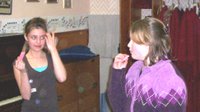 "Nuk, nuk, nuk!"
"Nuk, nuk, nuk!" "I think they like odd numbers -- or was it even?"
"I think they like odd numbers -- or was it even?"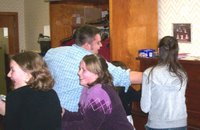 "Gaaaaaaaaaaa!"
"Gaaaaaaaaaaa!"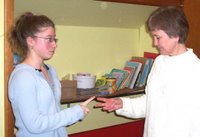 "Show a little respect there, V.!"
"Show a little respect there, V.!"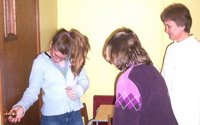 "That's better."
"That's better."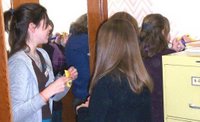 "Gollogoskins!!!!"
"Gollogoskins!!!!"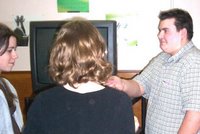 Why is his face so white?
Why is his face so white?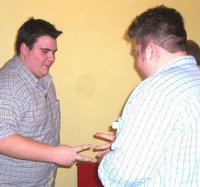 "Hey bro, respect your youngers."
"Hey bro, respect your youngers."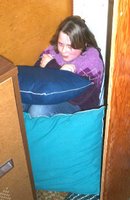 Culture shocked!!
Culture shocked!!







